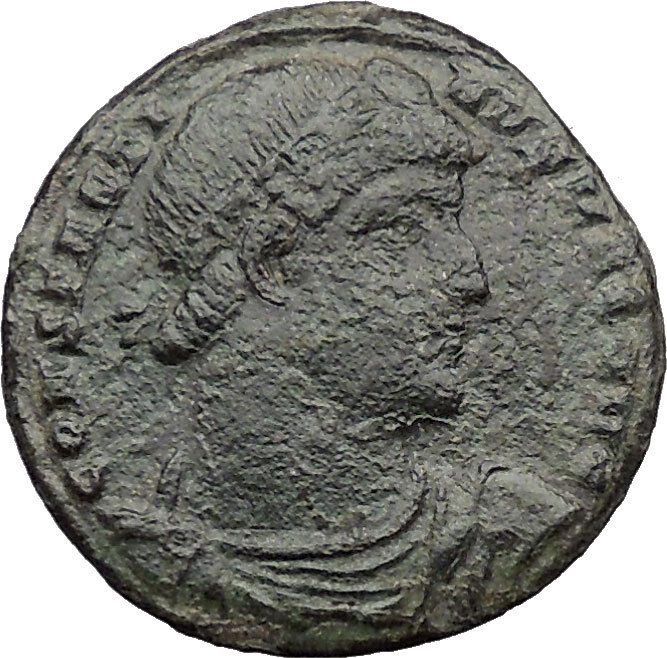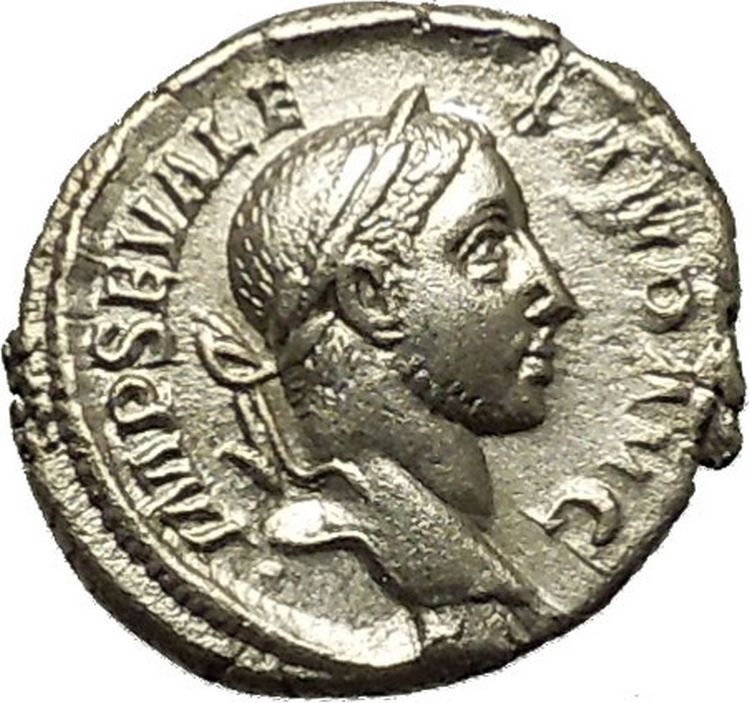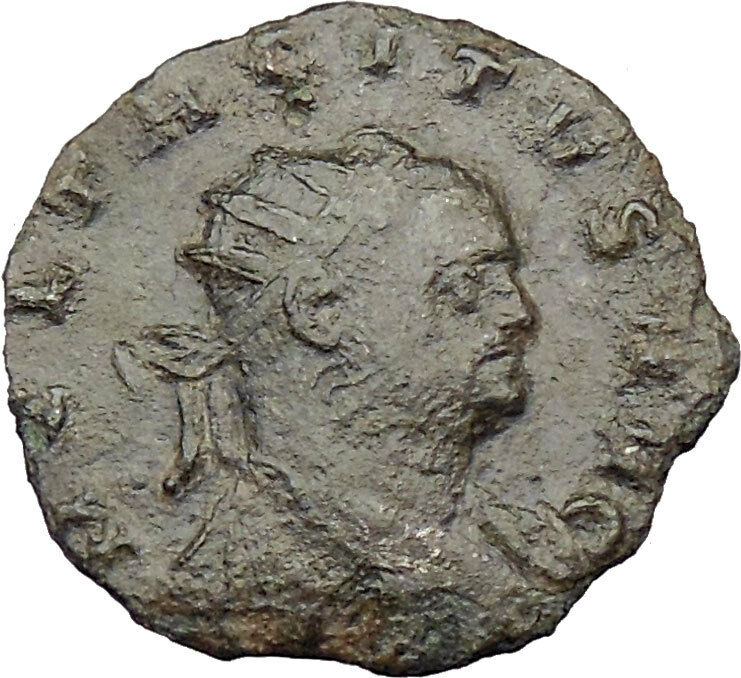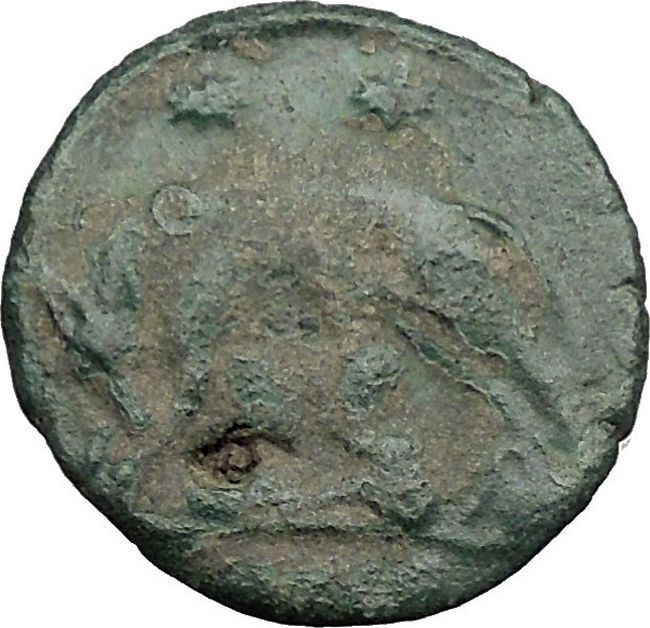|
Philip I
‘the Arab’ –
Roman Emperor
: 244-249 A.D. –
Silver Antoninianus 23mm (4.66 grams) Rome mint: 244 A.D.
Reference: RIC 53, C 240
IMPMIVLPHILIPPVSAVG – Radiate, draped and cuirassed bust right.
VIRTVSAVG – Virtus seated left, holding branch and spear.
You are bidding on the exact
item pictured, provided with a Certificate of Authenticity and Lifetime
Guarantee of Authenticity.
Virtus was a specific
virtue
in
Ancient Rome
. It carries connotations of valor,
manliness, excellence, courage, character, and worth, perceived as masculine
strengths (from Latin
vir, “man”). It was thus a
frequently stated virtue of
Roman emperors
, and was personified
as a deity
.
Origins
The origins of the word virtus can be traced back to the Latin word
vir, “man”. The common list of attributes associated with virtus are
typically perceived masculine strengths, which may indicate its derivation from
vir. From the early to the later days of the Roman Empire, there appears
to have been a development in how the concept was understood.
Originally virtus was used to describe specifically martial courage,
but it eventually grew to be used to describe a range of Roman virtues. It was
often divided into different qualities including prudentia (prudence),
iustitia
(justice),
temperantia
(temperance,
self-control), and
fortitudo
(courage). This division of
virtue as a whole into
cardinal virtues
is today classified as
virtue ethics
, as described by
Plato
‘s
Republic
and
Aristotle
‘s
Nicomachean Ethics
. It implies a link
between virtus and the Greek concept of
arete
.
This inclusion leads to the belief that at one time virtus extended to
cover a wide range of meanings that covered one general ethical ideal. The use
of the word began to grow and shift to fit the new idea of what manliness meant.
No longer did virtus mean that a person was a brave warrior but it could
also mean that he was a good man, someone who did the right thing. During the
time of the decline of the Roman elite virtus the Roman upper class no
longer thought of themselves as unmanly if they did not serve in the military.
Virtue as described by Aristotle was rediscovered in the medieval age by
Muslim
philosopher
Averroes
, which in turn impacted
Thomas Aquinas
to fuse virtue ethics with
Christianity in connection with the
Renaissance of the 12th century
.
In Roman
political philosophy
Virtus comes from the aristocratic tradition in which it is a specific
type of public conduct. It is really only applicable in the
cursus honorum
, certainly by the late
republic at least. It is not a “private” virtue in the way that modern people
might consider it. Valor, courage, and manliness are not things that can be
pursued in the private sphere of the individual or the individual’s private
concerns. There could be no virtue in exploiting one’s manliness in the pursuit
of personal wealth, for example. virtus is exercised in the pursuit of
gloria for the benefit of the
res publica
resulting in the winning of
eternal “memoria.” According to D.C. Earl “Outside the service of the res
publica there can be no magistratus and therefore, strictly speaking,
no gloria, no nobilitas, no virtus“.
For the nobility virtus lies not only in one’s personal “acta” but
also that of one’s ancestors. However Cicero, a
novus homo
, asserted that virtus was
a virtue particularly suited to the new man just as nobilitas was suited to the
noble. Cicero argued that just as young men from noble families won the favor of
the people so too should the novus homo earn the favor of the people with his
virtus. He even extended the argument that virtus and not one’s
family history should decide a man’s worthiness. Virtus is something that
a man earns himself, not something that is given to him by his family, thus it
is a better measure of a man’s ability. Cicero’s goal was not to impugn the
noble class but widen it to include men who had earned their positions by merit.
The term was used quite significantly by the historian
Sallust
, a contemporary of Cicero. Sallust
asserted that it did not rightfully belong to the nobilitas as a result
of their family background but specifically to the
novus homo
through the exercise of
ingenium (talent). For Sallust and Cicero alike, virtus is situated
in the winning of glory by the execution of illustrious deeds (egregia
facinora) and the observance of right conduct through bonae artes.
Who could have it?
Virtus was not universally applicable to just anyone – generally
(although not always exclusively) only adult male Roman citizens would be
thought of as possessing virtus.
Women
Virtus was rarely to women, likely because of its association with
vir. The highest regarded female virtue was pudicitia: “modesty” or
“chastity”. Cicero
, however, attributes this characteristic
to females several times. He uses it once to describe
Caecilia Metella
when she helps a man who is
being chased by assassins. Twice more he uses it when describing his daughter,
Tullia
, portraying her in his letters as brave
in his absence. He uses it again to describe his first wife
Terentia
during his exile. Livy in Book 2
attributes it to Cloelia.
Children
Virtus was not a term commonly used to describe children. Since
virtus was primarily attributed to a full grown man who had served in the
military, children were not particularly suited to obtain this particular
virtue.
Slaves
While a
slave
was able to be homo (“man”) he was
not considered a vir. Slaves were often referred to as puer (Latin
for boy) to denote that they were not citizens. Since a slave could not
be a vir it follows that they would not be allowed to have the quality of
virtus. Once a slave was manumitted he was able to become a vir
and he was also classified as a freedman but this did not allow him to have
virtus. A good slave or freedman was said to have fides, but no
virtus.
Foreigners
Foreigners
in the Roman world could be
attributed with virtus: If they fought bravely they could be said to have
virtus. Virtus could also be lost in battle. Virtus could
even be a cause to gain citizenship as in the case of Spanish cavalry men
granted citizenship by Cn. Pompeius Strabo in 89 B.C.E. for their virtus
in battle.
How was it used?
Virtus applies exclusively to a man’s behaviour in the public sphere,
i.e. to the application of duty to the
res publica
in the
cursus honorum
. His private business was no
place to earn virtus, even when it involved courage or feats of arms or
other qualities associated to it if performed for the public good.
In private
While in many cultures around the world it is considered “manly” to father
and provide for a family, family life was considered in the Roman world to be
part of the private sphere. During this time there was no place for virtus
in the private sphere. Most uses of virtus to describe any part of
private life are ambiguous and often refer to another similar quality.[11]
In the Roman world the oldest living patriarch of the family was called the
pater familias
and this title implied that
he was able to make all legal and binding decisions for the family; he also
owned all the money, land, and other property. His wife, daughters, sons, and
his sons’ families were all under his
potestas
. The only time a son was seen as
separate from his father’s control in the eyes of other Romans was when he
assumed his public identity as a citizen. He could earn his virtus by
serving in the military, and thus could only demonstrate manliness outside of
the family setting. This is another reason that virtus is not often used
to describe the Roman private life.
In public
Virtus was a crucial component for a political career. Its broad
definition led to it being used to describe a number of qualities that the Roman
people idealized in their leaders.
In everyday life a typical Roman, especially a young boy, would have been
inculcated with the idea of virtus. Since military service was a part of
most Roman men’s life, military training would have started fairly early. Young
boys would have learned how to wield weapons and military tactics starting at
home with their fathers and older male relatives and later in school. Also as a
young boy one would have heard numerous stories about past heroes, battles, and
wars. Some of these stories would have surely told of the virtus of past
heroes, and even family members. Publicly it was easy to see the rewards of
virtus. Public triumphs were held for victorious generals and rewards were
given to brave fighters. All of this propaganda would have encouraged young boys
coming into their manhood to be brave fighters and earn the attribute of
virtus. It was the duty of every generation of men to maintain the
dignitas
which his family had already
earned and enlarge it. This pressure to live up to the standards of one’s
ancestors was great. In achieving virtus one could achieve
gloria
. By gaining virtus and
gloria one could hope to aspire to high political office and great renown.
While young boys were encouraged to earn virtus there were also limits
put on showing virtus in public. Virtus was often associated with
being aggressive[citation
needed] and this could be very dangerous in the
public sphere and the political world. Displays of violent virtus were
controlled through several methods. Men seeking to hold political office
typically had to follow the
cursus honorum
. Many political offices had
an age minimum which ensured that the men filling the positions had the proper
amount of experience in the military and in government. This meant that even if
a man proved himself capable of filling a position or was able to persuade
people that he was capable, he would not necessarily be able to hold the
position until he had reached a certain age. This also served to ensure that in
elections of public offices no one had a certain advantage over another person
because by the time most men went into public office they would have retired
from military service. Furthermore, before any Roman soldier could partake in
single combat he had to gain permission from his general. This procedure was
meant to keep soldiers from putting themselves in extremely dangerous situations
that they may or may not have been able to handle in order gain virtus.
The concept of virtus also tended to be a concept of morality as far
as politics were concerned. This could range from the very literal definition of
manliness seen in aggression and the ruthless acquisition of money, land, and
power, or the lighter, more idealistic political meaning which almost took on
the extended meaning of “pietas”, a man who was morally upright and concerned
with the matters of the state. Plautus in
Amphitruo
contrasted virtus and
ambitio. Virtus is seen as a positive attribute, though ambitio
itself is not necessarily a negative attribute but is often associated with
negative methods such as bribery.
Plautus
said that just as great generals and
armies win victory by virtus, so should political candidates. Ambitio
“is the wrong method of reaching a good end.” Part of virtus, in the
political sphere was to deal justly in every aspect of one’s life, especially in
political and state matters.
Military
Although the two concepts are related, virtus, for the Roman, did not
necessarily emphasize the behavior that the associations of the present-day
English term ‘virtue’ suggest. Virtus was to be found in the context of
‘outstanding deeds’ (egregia facinora), and brave deeds were the
accomplishments which brought gloria (‘a reputation’). This gloria
was attached to two ideas: fama (‘what people think of you’) and
dignitas (‘one’s standing in the community’). The struggle for virtus
in Rome was above all a struggle for public office (honos), since it was
through aspiring to high office, to which one was elected by the People, that a
man could best show his manliness by means of military achievement which would
in turn cultivate a reputation and votes. It was the duty of every aristocrat
and would-be aristocrat to maintain the dignitas which his family had
already achieved and to extend it to the greatest possible degree, through
higher political office and military victories. This system resulted in a strong
built-in impetus in Roman society to engage in military expansion and conquest
at all times.
Sexuality
While in many cultures the virtue of manliness is also seen as being partly
sexual, in the Roman world virtus apparently did not have sexual
connotations. Similar words deriving from the same stem often have sexual
connotations. In the Roman world virtus dealt with a great many areas
such as martial courage, honor, and being morally upright rather than sexual
manliness.
Examples
One of the most well known demonstrations of virtus was shown by
Lucius Quinctius Cincinnatus
. Before
Cincinnatus was appointed dictator in 458 BCE, Rome was in the midst of a battle
with the Aequi
and needed someone to take control.
Messengers sent to fetch him found him plowing in his field. Upon being informed
of the appointment, he wept saying, “So my field will be unsown this year, and
we shall be in danger of not having enough food to support us.”[16]
Nevertheless, he dutifully gathered his things, kissed his wife goodbye and
departed to raise an army and defeat the Aequi in a mere fifteen days. Upon
returning home after the victory, Cincinnatus picked up the plough from where he
left it and began plowing again.
Dionysius of Halicarnassus
recounts this story
to illustrate the type of leaders the men of Rome were. He says that they
“worked with their hands, led self-disciplined lives, did not complain about
honorable poverty, and far from pursuing positions of royal power.”
Pompey
is another prominent example of
virtus. In 55 BCE, Pompey inaugurated his grand theatre complex and
dedicated several shrines to different gods, one of these being Virtus.
This consecrated Pompey’s link with virtus. He gained a reputation with
the public as being a man of virtus. Cicero, throughout his speech, the
De imperio Cn. Pompei, connects Pompey with “divina virtus”.[18]
Pompey was so closely connected with virtus that once during a production
of a play at the
Ludi Apollinares
one of the characters
spoofed Pompey by stating “eandem virtutem istam veniet tempus cum graviter
gemes”: “The time will come when you bitterly resent that same virtus“.
The audience did not need to hear his name to know that Pompey was being
referenced.
Marcellus and the
Temple
M. Claudius Marcellus
, during the battle of
Clastidium
in 222 BCE, dedicated a temple to
Honos
and Virtus. This was one of the first
times that Virtus had been recognized as divine. The connection with
Honos would have been obvious to most Romans as demonstrations of virtus
led to election to public office and both were considered honos. The cult
of Honos was already a long-standing tradition in Rome. The marriage of
the two deities ensured that Virtus would also get proper respect from
the Romans. But an objection by the pontiffs was that one temple could not
properly house two gods because there would be no way of knowing which god to
sacrifice to should a miracle happen in the temple.
Marcus
Julius Philippus or Philippus I Arabs (c. 204–249), known in
English
as Philip the Arab or formerly (prior to World War II) in
English as Philip the Arabian, was a
Roman
Emperor
from 244 to 249.
//
Little is known about Philip’s early life and political
career. He was born in
Shahba
, about
55 miles southeast of
Damascus
,
in the
Roman province
of
Syria
. Philip has the nickname “the Arab” because he had family who had
originated in the
Arabian peninsula
, believed to be distant descendants of the prestigious
Baleed family of Aleppo
. Philip was the son of a Julius Marinus, a local Roman citizen,
possibly of some importance. Many historians[1][2][3]
agree that he was of Arab descent who gained
Roman citizenship
through his father, a man of considerable influence. Many
citizens from the provinces took Roman names upon acquiring citizenship. This
makes tracing his Arabic blood line difficult. However, it is documented that
Rome used the
Ghassan
tribe from the
Azd of
Yemen
as vassals
to keep the neighboring northern Arabs in check.
The name of Philip’s mother is unknown, but sources refer to
a brother,
Gaius Julius Priscus
, a member of the
Praetorian guard
under
Gordian
III
(238–244). In 234, Philip married
Marcia Otacilia Severa
, daughter of a Roman Governor. They had two children:
a son named Marcus Julius Philippus Severus (Philippus
II) in 238 and according to numismatic evidence they had a daughter called
Julia Severa or Severina, whom the ancient Roman sources don’t mention.
Philip became a member of the
Pretorian Guard
during the reign of the emperor
Alexander Severus
, who was a Syrian. In ancient Rome the Pretorian Guard was
closely associated with the emperor, serving among other things as the emperor’s
bodyguard.
Political
career
In 243, during
Gordian
III
‘s campaign against
Shapur I
of
Persia, the
Praetorian prefect
Timesitheus
died under unclear circumstances. At the suggestion of his
brother Priscus, Philip became the new Praetorian prefect, with the intention
that the two brothers would control the young Emperor and rule the Roman world
as unofficial regents. Following a military defeat, Gordian III died in 244
under circumstances that are still debated. While some claim that Philip
conspired in his murder, other accounts (including one coming from the Persian
point of view) state that Gordian died in battle. Whatever the case, Philip
assumed the purple following Gordian’s death. According to Edward Gibbon:
His rise from so obscure a station to the first dignities
of the empire seems to prove that he was a bold and able leader. But his
boldness prompted him to aspire to the throne, and his abilities were
employed to supplant, not to serve, his indulgent master.
Philip was not willing to repeat the mistakes of previous
claimants, and was aware that he had to return to
Rome in order to
secure his position with the
senate
. He thus travelled west, after concluding a peace treaty with Shapur
I, and left his brother Priscus as extraordinary ruler of the Eastern provinces.
In Rome he was confirmed
Augustus
, and nominated his young son
Caesar
and heir.
Philip’s rule started with yet another
Germanic
incursion on the provinces of
Pannonia
and the Goths
invaded Moesia
(modern-day Serbia
and Bulgaria
)
in the Danube
frontier. They were finally defeated in the year 248, but the
legions
were not satisfied with the result, probably due to a low share of the plunder,
if any. Rebellion soon arose and
Tiberius
Claudius Pacatianus
was proclaimed emperor by the troops. The uprising was
crushed and Philip nominated
Gaius Messius
Quintus Decius
as governor of the province. Future events would prove this
to be a mistake. Pacatianus’ revolt was not the only threat to his rule: in the
East, Marcus Jotapianus
led another uprising in response to the oppressive rule of
Priscus
and the excessive taxation of the Eastern provinces. Two other
usurpers, Marcus Silbannacus
and
Sponsianus
,
are reported to have started rebellions without much success.
In April
A.D.
248 (April 1000
A.U.C.
), Philip had the honour of leading the celebrations of the one
thousandth birthday of Rome, which according to tradition was
founded
in 753 BC by
Romulus
. He combined the anniversary with the celebration of Rome’s alleged
tenth saeculum
.
According to contemporary accounts, the festivities were magnificent and
included spectacular games,
ludi saeculares
, and theatrical presentations throughout the city. In the
coliseum, more than 1,000 gladiators were killed along with hundreds of exotic
animals including hippos, leopards, lions, giraffes, and one rhinoceros.
The events were also celebrated in literature, with several publications,
including
Asinius Quadratus
‘s History of a Thousand Years, specially prepared
for the anniversary.
Despite the festive atmosphere, discontent in the legions was
growing. Decius
(249–251) was proclaimed Emperor by the Danubian armies in the spring of 249 and
immediately marched to Rome. Philip’s army met the usurper near modern
Verona
that summer. Decius won the battle and Philip was killed sometime in
September 249,
either in the fighting or assassinated by his own soldiers who were eager to
please the new ruler. Philip’s eleven-year-old son and heir may have been killed
with his father and Priscus disappeared without a trace.
Religious
beliefs
Further information:
Philip the Arab and Christianity
Some later traditions, first mentioned in the historian
Eusebius
in his
Ecclesiastical History
, held that Philip was the first
Christian
Roman emperor. This tradition seems to be based on reports in
Eusebius that Philip allegedly had once entered a Christian service on Easter,
after having been required by a bishop to confess his sins. Later versions
located this event in Antioch.
However, historians generally identify the later Emperor
Constantine, baptised on his deathbed, as the first Christian emperor, and
generally describe Philip’s adherence to Christianity as dubious, because
non-Christian writers do not mention the fact, and because throughout his reign,
Philip to all appearances (coinage, etc.) continued to follow the
state religion
.
Critics ascribe Eusebius’ claim as probably due to the tolerance Philip showed
towards Christians.
Saint Quirinus of Rome
was, according to a legendary account, the son of
Philip the Arab.
|








